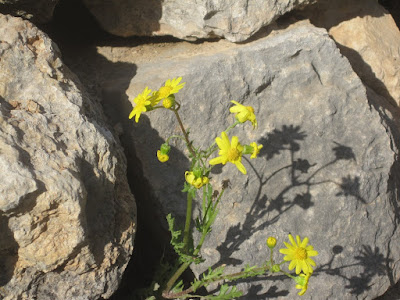On Saturday we fixed up the garden at University Lutheran Chapel here in Berkeley. The topic of
"biblical gardens" game up, and we wondered about doing something like that with our garden beds.
Then I remembered: I have first-hand experience of biblical plants -- from the trip I took to Palestine two years. (A trip which, incidentally, was where I met the Berkeley pastor who is the reason I ended up moving to California from Chicago!)
I've re-posted below a blog post about the flowers of Palestine that I wrote during that trip. (Here is a link to the rest of the posts from that trip . . .
Faith in the Face of Empire: A journey in search of hope in the land of conflicting narratives.) (And here is a link to one of the many posts on this blog that emerged from that trip:
ELCA Resolution on Palestine / Israel: What Does It Mean for Us? )
While I'm at it -- here are a couple of other garden-related posts:
A Dream of a "Dream of Red Chambers" Garden for Chicago and
One Word: Wildflowers (on the
Zero Carbon Chicago blog).
* * *
What Might a Blossom Signify?
(originally published March 20, 2015)
Why was this day different from every other day (on our trip)?
Because today was the day that we hiked through the beautiful nature area in
Battir.
As we entered the stone steps into the area, we began to get a sense of its grandeur:
The terraced hillside on our right-hand side was filled with olive trees:
Beautiful red poppies dotted the trail from beginning to end:
Wild irises poked up all along the trail as well:
Occasionally, we would pause at remnants left by long-ago inhabitants of
the land, such as this vault carved into the rock hillside:
But mainly this walk on the first day of spring 2015 was about renewed life.
Besides the red poppies and the purple irises, it seemed as if there
was a flower to claim each of the colors in the rainbow — such as these
yellow ones springing up at trailside . . .
and these magenta cyclamen clinging to the rocks at shoulder level . . .
and lone white poppies here and there . . .
As I walked along, in this place so full of meaning, with these
distinctive floral sentinels along every inch of the pathway, it
suddenly seemed perfectly understandable that people have so often
throughout history thought of
each type of flower embodying a specific meaning.
What might these blossoms signify?
Every time I lifted my eyes from the trail, I discovered another slice of hillside that was like something crafted by a jeweler:
and the promise of yet more enchanting discoveries just around the corner:
Not all of the plants sported brilliant colors. Yet everything we encountered, whether pine cones . . .
Or thistle stems . . .
. . . was spectacular in its own way.
Some flowers cried out from the ground for our attention (“Look at us!
We’re magenta, too!”) . . .
while others stretched up to confront us eye-to-eye (“Have you ever seen anything as beautiful as me?”) . . .
and a few stubborn fellows seemed to be doing everything they could to
ignore us, staking out lonely spots among the rocks and focusing on the
sky (“Summer sun? Bring it on!”) . . .
As we reached the end of the trail, we saw an almond tree whose blossoms
framed a structure on crest of the hill in the distance.
It made me think of the Palestinian poet,
Mahmoud Darwish, who wrote,
If a writer were to compose a successful piece
describing the almond blossom, the fog would rise
from the hills, and people, all the people, would say:
This is it.
These are the words of our national anthem.
(See “
Review: Darwish, between the national and the human” by Raymond Deane on the
Electronic Intifada website.)
Could a writer write the story of “faith in the face of empire” in the language of flowers?
Please share this post . . . .



























































